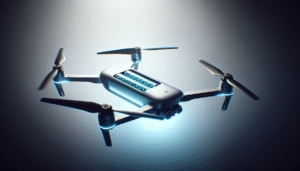Are intelligent drone batteries truly worth the investment for enhanced performance and reliability? It’s a question I’ve pondered too, especially when considering the flurry of options available in the market. Drones themselves are a fascinating blend of technology and creativity, and their batteries are no less impressive. These powerhouses typically promise longer flight times, advanced safety features, and even real-time diagnostics. But how much of this is necessary for someone like me who enjoys flying a drone for both leisure and occasional professional tasks? Let’s dive into this topic with a friendly chat about the pros and cons, comparisons, and what makes an intelligent drone battery stand out.
)
Understanding Smart Drone Batteries
Before exploring the specifics of which models to consider, it’s essential to first understand what makes a drone battery “smart.” In essence, smart batteries are equipped with technology that goes beyond merely powering your drone. These batteries come with onboard chips that manage various tasks such as measuring voltage, current, and the overall health of the battery. This additional tech layer aims to extend the lifespan of your battery while providing more reliable performance.
Features of Smart Drone Batteries
The allure of intelligent drone batteries lies in their advanced features. Here’s what you generally find packed inside these tiny power blocks:
- Battery Management System (BMS): This ensures efficient energy use and protects against overcharging and excessive discharging.
- Real-Time Monitoring: Provides live updates on battery status, like remaining power and temperature.
- Self-Discharge Mechanism: Safeguards the battery during storage by automatically discharging to a safe level after a specified period.
- Improved Compatibility: Many intelligent batteries are designed to fit specific drone models seamlessly, ensuring optimal power use.
Advantages
Given the features listed above, intelligent drone batteries come with several clear advantages:
- Enhanced Flight Safety: With real-time monitoring, you’re less likely to encounter unexpected battery failures mid-flight.
- Longevity: Proper management of charging and discharging cycles means these batteries can typically last longer than their non-smart counterparts.
- Convenience: They take the guesswork out of battery maintenance, allowing you to focus more on flying and less on battery management.
Potential Drawbacks
However, like any advanced technology, intelligent batteries are not without their drawbacks:
- Higher Cost: All these features generally come with a higher price tag.
- Compatibility Limitations: These batteries are often designed for specific drones, meaning less flexibility if you have multiple drone models.
- Complexity: The additional technology can introduce more components that could potentially fail or require updates.
Comparing Five Smart Drone Battery Models
With a basic understanding of what makes a smart battery “smart,” it’s time to compare five popular models on the market today. This comparison is designed to highlight what you can expect to gain or sacrifice with each model.
| Model | Capacity | Flight Time (Approx.) | Safety Features | Price Range (USD) |
|---|---|---|---|---|
| DJI Intelligent | 4480 mAh | 23-28 minutes | Auto-discharge, LEDs | $100 – $150 |
| Parrot Anafi | 2700 mAh | 25 minutes | BMS, LEDs | $70 – $100 |
| Autel Robotics EVO | 4300 mAh | 30 minutes | Low-voltage, overheating | $75 – $110 |
| Yuneec Typhoon H | 5400 mAh | 25 minutes | Overcharge protection | $120 – $180 |
| Hubsan Zino | 3000 mAh | 23 minutes | Temperature warning | $50 – $80 |
DJI Intelligent Battery
These batteries are like the celebrity stars of the intelligent battery world, especially when it comes to DJI drones. With a generous capacity of 4,480 mAh, they offer a respectable flight time of 23 to 28 minutes. What sets them apart are features like auto-discharge to maintain battery health if left unused for extended periods and LED indicators for a quick status check. Yes, they are on the pricier side, but the reliability and enhanced safety features often make the expense worthwhile.
Parrot Anafi Battery
The Parrot Anafi model strikes a balance between affordability and performance. With a 2700 mAh capacity offering roughly 25 minutes of flight time, it is more budget-friendly without skimping on essential features. Embedded BMS and LED indicators enhance the user experience, providing critical data at a glance. These characteristics make it an attractive option for those who are budget-conscious yet seek reliability. If you’re looking for [the top 5 popular drone models and what makes each unique](https://droneaperture.com/top-5-popular-drone-models-and-what-makes-each-unique-for-different-users/), the Anafi often makes the list for its portability and smart power management.
Autel Robotics EVO Battery
For those who prioritize flight time, the Autel Robotics EVO battery is a winner. With a 4,300 mAh capacity, resulting in approximately 30 minutes of flight time, it leads the pack in durability. The safety features, such as low-voltage protection and overheating notifications, are crucial for extending the battery’s life and ensuring safe flights.
Yuneec Typhoon H Battery
The Yuneec Typhoon H effectively combines a large capacity with robust safety measures. Featuring a 5400 mAh capacity, it provides a flight time of approximately 25 minutes. Its overcharge protection keeps the battery secure while maintaining a solid performance. It comes at a higher price point, making it ideal for those who are less concerned about initial costs but more focused on extended use and reliability.
Hubsan Zino Battery
The Hubsan Zino battery defies expectations with its combination of affordability and innovative technology. With a 3000 mAh capacity, the flight time can reach around 23 minutes. Equipped with temperature warning systems, it offers innovative features without a hefty price tag, making it a great match for an [FPV foldable drone for beginners](https://droneaperture.com/fpv-foldable-drone-for-beginners-review/).
)
Are They Worth It?
So, are intelligent drone batteries worth the hype and investment? If you’re someone like me who strives for smooth, worry-free drone flights, the short answer is a resounding yes. However, the extent of their worth really depends on your specific needs and usage patterns.
If you’re serious about capturing high-quality aerial footage—perhaps even with a [drone with a camera for kids](https://droneaperture.com/drone-with-camera-for-kids-review/) to teach them the ropes safely—then investing in an intelligent battery is a wise choice. Their automation in managing health and performance can significantly reduce the risk of mid-air hiccups, leaving you free to focus on mastering those perfect aerial moves.
Considerations for Buyers
Before making a purchase, consider the following factors:
- Purpose: Are you a hobbyist, a professional photographer, or someone in between?
- Budget: Are you willing and able to spend more upfront for long-term savings and convenience?
- Drone Compatibility: Ensure the intelligent battery is compatible with your current or intended drone models.
- Flexibility: Do you intend to use the battery across multiple drone types?
By carefully evaluating these aspects, you can make a more informed decision that aligns perfectly with your needs. When you are out in the field, you might also want to look into a [40000mAh portable charger](https://droneaperture.com/40000mah-portable-charger-review/) or a [Grecell 300W portable power station](https://droneaperture.com/grecell-300w-portable-power-station-review/) to keep these smart batteries charged and ready to go.
Conclusion
In the ever-evolving world of drone technology, intelligent drone batteries have carved out a niche for those who desire enhanced performance, safety, and the latest conveniences. While they may command a higher initial investment, the benefits they offer in terms of reliability and longevity are compelling. By considering the various attributes and specifications of different models, you can determine whether these high-tech power sources are right for you, ensuring countless hours of carefree flying.


